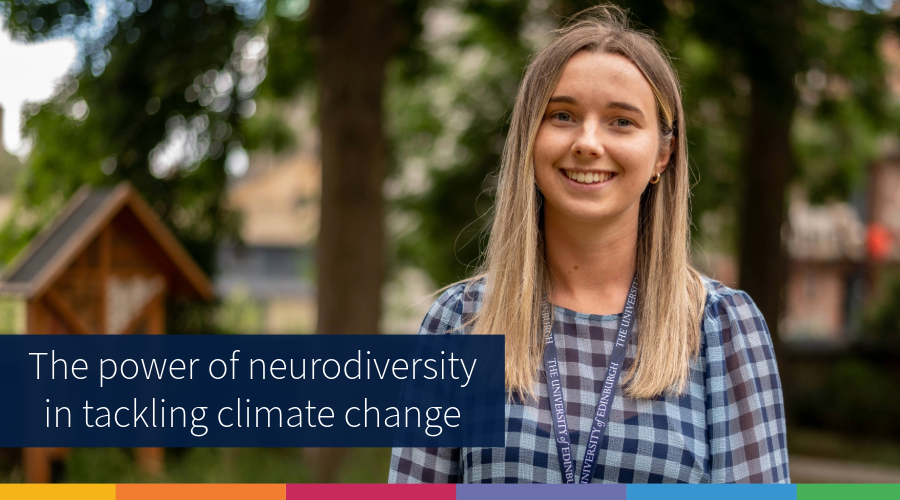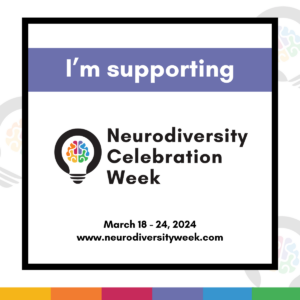The power of neurodiversity in tackling climate change

It’s Neurodiversity Celebration Week! I’m Eve Redhead, Communications Coordinator at the University of Edinburgh’s Department for Social Responsibility and Sustainability. As we come together to celebrate the unique strengths and perspectives of neurodivergent individuals, I wanted to explore the profound impact neurodiversity can have on climate action.
What is neurodiversity?
Neurodiversity describes the idea that people experience and interact with the world around them in many different ways. It is an umbrella term for a range of variations in cognitive function including:
- Autism or Autism Spectrum Conditions
- ADHD: Attention Deficit Hyperactivity Disorder or ADD: Attention Deficit Disorder
- Dyscalculia
- Dyslexia
- Dyspraxia or Developmental Coordination Disorder (DCD)
Most people are neurotypical, meaning that the brain functions and processes information in the way society expects. However, approximately 1 in 7 people in the UK are neurodivergent, meaning that the brain functions, learns and processes information differently.
A personal journey
My own neurodivergent journey began in primary school, where my conditions were first acknowledged. It wasn’t until university that I received a formal dyslexia diagnosis, and more recently, an NHS referral for autism spectrum condition and ADHD.
Navigating the educational professional and personal landscape with undiagnosed neurodivergence presented its challenges. Like many individuals, I faced obstacles without fully understanding my unique strengths and needs. The journey has been one of resilience, self-advocacy, and a continual quest for self-understanding.
Neurodiversity and sustainability
From a young age, my passion for sustainability has been a driving force in my life. At the age of 10, I took the initiative by writing to my local Member of Parliament, advocating for improved recycling facilities and more sustainable travel infrastructure in our town.
This early engagement marked the beginning of a commitment that has transcended various challenges in both my educational and professional journey. Sustainability isn’t just a field of study or a career path for me; it’s a deeply ingrained passion that has fuelled my resilience and determination.
A LinkedIn survey in the sustainability field revealed that an inspiring 57% of respondents identify as neurodivergent. This significant representation emphasises the potential impact neurodivergent thinking can have on addressing global challenges, especially in the realm of climate action.
Neurodivergent individuals, particularly those with ADHD and autism, often possess a profound sense of justice and fairness. We are by nature strategic big picture planners, thinkers on our feet, firefighters and problem solvers. Our strengths include being dedicated and hardworking, creative, innovative, empathetic and nurturing. So, it’s unsurprising so many neurodivergent people have found themselves involved in the climate movement – one of, perhaps the most important – issues of our time.
Neurodiverse perspectives for a sustainable future
The World Economic Forum advocates for integrating neurodiverse perspectives in addressing climate and environmental challenges. Creativity, experimentation and exploration are all examples of qualities that benefit from neurodivergent thinking styles. By fostering collaboration among individuals with diverse cognitive approaches, we can create an environment that thrives on innovation, a key element in tackling the complex challenges of sustainability.
Drawing inspiration from Solitaire Townsend’s insights on neurodivergent thinking—questioning assumptions, being aware of mistakes, recognising injustices, finding alternative paths, and embracing bold experimentation—we have a practical framework to approach climate action differently.
The easy, straight path from A to B is often unavailable to neurodiverse people […] The winding, off road path is often the only option for dyslexics – and down it, there are discoveries and creative solutions you otherwise wouldn’t stumble across. So, imagine the most straightforward path isn’t open to you. Where can you go instead?.

Solitaire Townsend is a sustainability expert, speaker and solutionist. Photo by Sarah Penrhyn Jones
The concept is that by bringing together different ways of thinking, we can uncover creative solutions, propelling us towards a future that is not only better but also more resilient and sustainable.
World Economic Forum [External]
Dyslexic thinking for Sustainability [External]
Celebrating strength in our differences
As we recognise Neurodiversity Celebration Week, let’s celebrate the voices of neurodivergent individuals in the sustainability field. By recognising and embracing neurodiversity, we pave the way for a more inclusive, innovative, and sustainable future for all.
Collectively, let’s appreciate the strength in our differences, driving us towards a brighter future.
Related Links
Neurodiversity Celebration Week [External]
Student Disability and Learning Service
British Dyslexia Association [External]
(https://commons.wikimedia.org/w/index.php?curid=128697814)





Good read. Thank you.
Please correct your language.
Individuals are neurodivergent or neurological. Individuals are not neurodiverse, only groups that are a mix of neurotypical and neurodivergent are neurodiverse.
Many thanks
Thank you for your feedback and for helping to promote understanding and inclusivity!